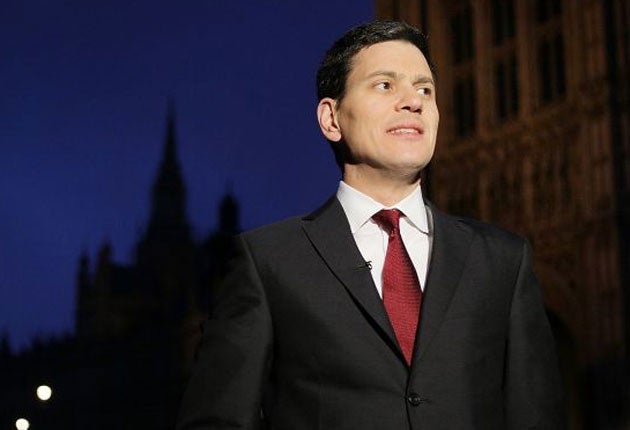Steve Richards: Miliband needs a lesson in political warfare

The Foreign Secretary, David Miliband, appears to be the biggest loser so far in the fall-out from the attempted coup. Labour MPs from various conflicting factions are expressing bewilderment, disdain and frustration at his hesitantly equivocal response. Miliband has delivered three statements on his attitude towards Brown, each of them different in tone, all of them ambiguous. Having taken longer than most Cabinet ministers to respond to the original Hewitt/Hoon missile, Miliband could not stop responding. He is like the proverbial bus. Having waited so long for a statement three come along at once.
Miliband is in that notoriously awkward position, a leader in waiting during a long phase of mutinous plotting against the serving leader. He has been the focus of feverish speculation on four occasions. That is a dangerously large number of speculative events without at any stage coming close to securing the crown. In 2007 Miliband was under pressure to stand against Brown when Tony Blair stood down. He did not immediately rule out such a move, only to do so after a few days of highly flattering media coverage. In the summer of 2008 he wrote an explosive article about Labour's future without mentioning Brown at a time when the Prime Minister's fortunes were at their lowest ebb. Miliband was the subject of glossy profiles in newspapers during the subsequent run-up to the party conference. Then he had a bad conference and no challenge followed. Last summer all eyes were on Miliband after the resignation of James Purnell. Miliband stayed.
In all three of those dramas Miliband made the right decisions, albeit clumsily. If he had stood against Brown in 2007 he would have been slaughtered. In 2008 he needed to raise his profile in order to be in a position to stand for the leadership if there was a vacancy. Last summer Miliband would have sparked a civil war if he had resigned with uncertain consequences for him and his party. He took the braver decision to stay put.
It is his behaviour in the latest leadership drama that takes some explaining. He has acted with even more awkward clumsiness than in the previous three, waiting until early Wednesday evening to issue a guarded statement of support for Brown, giving an even more reticent soundbite to the cameras and then making a more positive statement yesterday.
Evidently Miliband was waiting to see what happened once Hewitt/Hoon fired their gun on Wednesday afternoon and was in contact with other discontented Cabinet ministers also unsure about what would happen.
Almost certainly Miliband wondered fleetingly whether it might be the trigger that allowed him to make his move without being the Heseltine-like assassin. But by mid-afternoon the answer was obvious. There was virtually no support for the coup amongst Labour MPs and party activists were even more livid. Miliband could have issued his statement then and accepted the harsh reality, that within his party there was little appetite for a contest so close to the election. Instead he delayed and then issued guarded words that indicated his concerns about Brown.
What was the point of ambiguous mischief-making if it was not going to lead anywhere?
On Wednesday Miliband would have been crazy to strike against Brown on the back of such an inept initiative. Again he made the right decision, but the execution was poor, attention-seeking without having anything to say that merited attention. There are only two options in such situations for Cabinet ministers: wholehearted declarations of support, or insurrection. Miliband sought a third way, one that probably reflects his turmoil about what to do.
He could not enthuse about Brown without being dishonest about his own deep unease and yet he knew there was little support for an act of regicide. But Miliband's tentative lack of deftness during these highly charged moments suggests that he needs more experience in the art of political street fighting before he is ready to achieve his ambition to lead.
Join our commenting forum
Join thought-provoking conversations, follow other Independent readers and see their replies
Comments